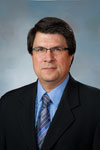Author turns love of reading into opportunity to create stories
Nalo Hopkinson sees interest in science fiction and fantasy stories as a kind of literary orientation.
“I like them because they’re weird, unexpected, and full of possibility,” said the author who is the next speaking in the spring University of Houston-Victoria/American Book Review Reading Series.
Hopkinson, a professor of creative writing at the University of California, Riverside, will read from her novel “Sister Mine” at 11 a.m. Feb. 21 in the UHV University West Alcorn Auditorium, 3007 N. Ben Wilson St. The event is free and open to the public.
“Nalo Hopkinson is a compelling writer who offers a unique twist to science fiction and fantasy tales,” said Jeffrey Di Leo, ABR editor and publisher, and dean of the UHV School of Arts & Sciences. “She uses the fantasy, folklore, myths and legends of her native cultures to craft cunning narratives.”
Hopkinson’s love for stories started when she was a child. Her father was a writer, and she was a voracious reader, she said. Then, at 16, her love of reading led to a revelation.
“I discovered an anthology of stories out of the Clarion Science Fiction Writers’ Workshop,” she said. “I’d been reading science fiction and fantasy for a while, but it was the first time I heard of there being someplace you could go to study how to do it.”
Although being part of a writer’s workshop was out of her reach as a teen living in Georgetown, Guyana, she published her first short story when she was 34, and was subsequently able to attend Clarion that year.
To keep her creative inspiration flowing, Hopkinson keeps a digital file of prompts for short stories. The prompts can be anything – an overheard phrase, a random notion, cool facts or even just a bunch of words that come together. If she is looking for a plot idea, she turns to this collection. Sometimes she’ll put two random ideas together, and the plot forms in the twists and turns of trying to shape the different concepts into one story.
Although she loves to read and write, Hopkinson does not have a set writing process. As someone who deals with Adult Attention Deficit Disorder, Non-Verbal Learning Disorder, fibromyalgia and a very busy life, she doesn’t usually write every day, she said.
“The best trick I’ve learned to get myself writing is to Open. The. File,” she said. “Then I'll generally get sucked in, sometimes for a good, long stretch, but often only for a few minutes. It doesn’t matter – unless I’m on deadline. It all adds up.”
In addition to sharing her work and encouraging attendees to find and read more of it, Hopkinson also wants to embolden people who think they wouldn’t dare write or create art to give it a try.
“It doesn’t have to be ‘perfect,’” she said. “No art ever is. Just make it, and keep making it. That’s how you get better.”
Other writers scheduled for the spring UHV/ABR Reading Series are:
Paul D. Miller, aka DJ Spooky, March 14 – Miller is the executive editor of ORIGIN Magazine and is a composer, multimedia artist, editor and author. His DJ MIXER iPad app has seen more than 12 million downloads during the last year. He’s produced and composed work for scores of major artists and award-winning films. His work as a media artist has appeared in museums, including The Venice Biennial for Architecture; the Ludwig Museum in Cologne, Germany; The Andy Warhol Museum in Pittsburgh; and many other museums and galleries. His book, “Sound Unbound,” an anthology of writings about electronic music and digital media, is a best-selling title for MIT Press. Miller is a contributing editor to “C-Theory” and the executive editor of Origin Magazine, which focuses on the intersection of art, yoga and new ideas.
Julie Iromuanya, April 11 – Iromuanya has short stories and novel excerpts appearing or forthcoming in the Kenyon Review, Passages North, Cream City Review and the Tampa Review, among other journals. Her writing has been shortlisted for several awards, including the Glimmer Train Family Matters and Very Short Fiction prizes, and the Kenyon Review Short Fiction Contest. She has been awarded scholarships and fellowships for the Sewanee Writers’ Conference, Bread Loaf Writers’ Conference and the Vermont Studio Center. She earned her doctorate from the University of Nebraska-Lincoln and was the inaugural Herbert W. Martin Post-Graduate Fellow at the University of Dayton. A scholar and writer, Iromuanya teaches for the creative writing Master of Fine Arts at the University of Arizona. “Mr. and Mrs. Doctor” is her first novel.
Joseph Tabbi, May 2 – Tabbi is the author of “Cognitive Fictions” and “Postmodern Sublime: Technology and American Writing from Mailer to Cyberpunk.” His biography of William Gaddis, “Nobody Grew But the Business,” was a runner-up for the biography/memoir award from the Chicago Society of Midland Authors. Most recently, he received the N. Katherine Hayles Award for the “Bloomsbury Handbook of Electronic Literature.”
ABR is a nonprofit, internationally distributed literary journal published six times a year. It began in 1977, moved to UHV in 2006 and has a circulation of about 8,000. The journal specializes in reviews of works published by small presses.
Authors are available after each reading to sign copies of their books. Each author also meets with students and attends a community reception.
For more information about the UHV/ABR Reading Series, call the ABR office at 361-570-4101 or go to www.americanbookreview.org.
The University of Houston-Victoria, located in the heart of the Coastal Bend region since 1973 in Victoria, Texas, offers courses leading to more than 80 academic programs in the schools of Arts & Sciences; Business Administration; and Education, Health Professions & Human Development. UHV provides face-to-face classes at its Victoria campus, as well as an instructional site in Katy, Texas, and online classes that students can take from anywhere. UHV supports the American Association of State Colleges and Universities Opportunities for All initiative to increase awareness about state colleges and universities and the important role they have in providing a high-quality and accessible education to an increasingly diverse student population, as well as contributing to regional and state economic development.
Lauren Hightower-Emerson
361-570-4342






